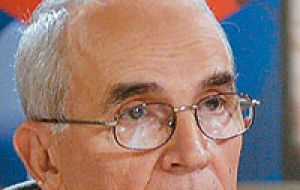MercoPress. South Atlantic News Agency
Raul Castro removes architect of the “convertible peso”
 Soberon exit could be anticipating serious financial crunch
Soberon exit could be anticipating serious financial crunch The head of Cuba's central bank Francisco Soberón has resigned after holding the job for fifteen years. He was replaced by Ernesto Medina who heads Banco Financiero Internacional, one of Cuba's biggest banks, according to an official announcement read on Thursday evening news.
Soberon, 64, also asked to be removed from the Cuban Communist Party's policy-making Central Committee and as a parliament deputy, it was announced.
The statement did not say when the move had taken effect and offered no explanation for his resignation, but recent restrictions placed on large cash withdrawals suggest a liquidity problem on the island.
Cuba has suffered severely from a fall in the international price of nickel (the country’s main export), less tourism because of the global crisis and the flu, and last year’s hurricanes that caused billions of US dollars in damages.
Soberon is known for carrying out the monetary policies of Castro's older brother, Fidel, who resigned from the presidency last year because of health problems.
In recent years, he oversaw the introduction of the Cuban convertible peso, which replaced the US dollar as Cuba's legal tender. The peso's value is tied to a basket of foreign currencies, including the dollar and the Euro.
Soberon will spend his time on his “old desire” of writing and analyzing international finances, said the Cuban television.
Cuban Foreign Minister Felipe Perez Roque and Vice President Carlos Lage were removed from the Cabinet in a stunning shake up in March. At the time, state media published letters that both men had written to Raul Castro, acknowledging they had committed errors and promising to continue to serve the country.
Since then, several other Cabinet members have also lost their jobs as a large scale streamlining effort fused ministries that were deemed to have similar, overlapping responsibilities




Top Comments
Disclaimer & comment rulesCommenting for this story is now closed.
If you have a Facebook account, become a fan and comment on our Facebook Page!